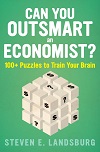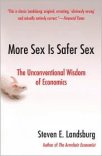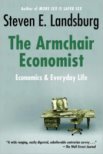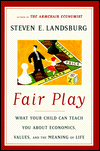Steven Landsburg Speaker Biography
World Authority on Economics and
the Numerical State of Affairs
Steven Landsburg is a professor of Economics at the University of Rochester and a world authority on economics and the numerical state of affairs. He is also the author of The Armchair Economist, Fair Play, More Sex is Safer Sex: The Unconventional Wisdom of Economics and his most recent book, Can You Outsmart an Economist?. In addition, he has penned two economics textbooks, a forthcoming text on general relativity.
Inspired by the work of mathematician André Weil, Steven Landsburg pursued the power of numbers as a career. He studied at both the University of Chicago and Princeton, where his reputation soared exponentially. On the academic front, Steven Landsburg’s work has influenced algebraic K-theory, quantum game theory, module patching, philosophy of science, and moral philosophy. And within the realm of popular culture, his work has appeared in Forbes, The New York Times, The Washington Post, and The Wall Street Journal.
Landsburg currently writes a monthly column on “everyday economics” for Slate magazine. The subjects of the columns cover a wide range of “equations” and often draw on current affairs. He has appeared as a commentator on the PBS/Turner Broadcasting series Damn Right and has made over 200 appearances on radio and television broadcasts over the past few years.
Do you know why tall people earn more money than their shorter competitors? Do you know why parents of sons stay married more often than parents who have only daughters? Do you know why it makes no sense for you to give charitable donations to more than one organization? Steven Landsburg does. His solutions to the many ways that modern life is unfair or inefficient are both jaw-dropping and maddeningly defensible.
Steven Landsburg Speaking Topics
The Economist on the Playground
How should we feel about taxes that redistribute income? Ask how parents feel about children who forcibly “redistribute” other children’s toys. How should we respond to those who claim their neighbors are too wealthy? Ask how parents respond when children complain their siblings got too much cake. By insisting that fairness can’t mean one thing for children and another for adults, this talk shows that the instincts of the parent have profound consequences for economic justice. We think most clearly about moral issues when we are speaking to our children. By listening to what we tell our children about good behavior on the playground, we can learn something about good behavior in the marketplace and in the voting booth.
A Brief History of Economic Time
Until just 200 years ago, nearly everybody lived just above the subsistence level the modern equivalent of about $400 to $600 a year. There was no such thing as economic progress, and no expectation of progress. No eighteenth century politician ever asked, “Are you better off than you were four years ago?”, because nobody ever expected to be better off than they were four years ago. Today, we are on a trajectory whereby a conservative extrapolation of our descendants a few centuries from now will have incomes of over a million dollars per day - not in some future nation ravaged dollars, but in the equivalent of today’s dollars. If that sounds implausible, consider how implausible our own wealth would have seemed to anyone living a few centuries ago. This is the story of economic growth - how it started, how far it’s taken us, where it’s headed, its power to lift billions out of poverty, and what we have to do to make sure it continues.
Armchair Economics
Why do celebrity endorsements sell products even when the celebrity has no special expertise? When rock concerts predictably sell out, why don’t promoters raise the prices? Why is popcorn so expensive at the movie theater (no, it’s not because the owner has monopoly power)? The world is filled with riddles, and economics is a powerful tool for unraveling them.
How to Fix Everything
Our prosperity depends on getting incentives right. Economists have a lot to contribute here. It was an economist who suggested that the airlines pay customers to give up their seats on overbooked flights. It was an economist who realized the best way to save endangered African elephants was by giving villagers a stake in their survival. Everything works better when incentives are designed to align private interests with the public good. We’ll talk about improving incentives for inventors and entrepreneurs, politicians and regulators, judges and juries, policemen and firefighters, polluters and environmentalists, and even college professors.
People Wanted
People solve problems, and when there are more people, more people get solved. Drawing on the evidence from a million years of history, this talk will argue that we’re more prosperous when we have more neighbors and that we should be encouraging population growth, not trying to limit it. We’ll explore the usual arguments on the other side (such as the finiteness of resources) and explain exactly why they’re not just wrong, but fundamentally illogical.
Surprise!
Common sense tells you that promiscuity spreads AIDS, population growth threatens prosperity, and misers make bad neighbors. This talk uses simple economic principles to challenge your common sense. We’ll see that daughters cause divorce, a thirst for revenge is healthier than a thirst for gold, the most charitable people support the fewest charities, and the tall, thin, and beautiful earn higher wages - but not for the reasons you think. This is a light-hearted presentation of ideas grounded in (sometimes maddeningly) rigorous logic. A little bit of reasoning can change the way we see the world.
Steven Landsburg Books

Can You Outsmart an Economist?
Purchase Book
More Sex is Safer Sex: The Unconventional Wisdom of Economics
Purchase Book
Armchair Economist: Economics & Everyday Life
Purchase Book





